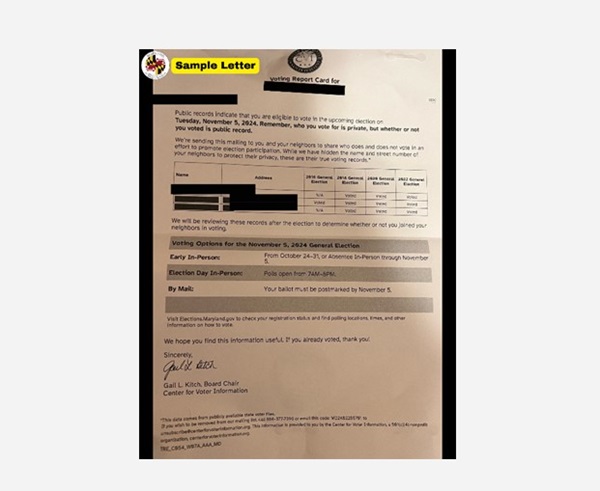BALTIMORE, MD—Maryland Attorney General Anthony G. Brown has issued a cease and desist letter (PDF) to the Center for Voter Information/Voter Participation Center (CVI/VPC), located in Washington, D.C., ordering the organization to immediately stop sending letters to Maryland voters that threaten to publicly expose those registered voters who do not vote in this year’s election, to refrain from sending threatening communications in the future, and to agree not to follow through on threats to embarrass non-voters by publishing that information to their neighbors.
“Voting is among the most important rights that Marylanders have. Any action that intimidates prospective voters, especially on the eve of such a consequential election, will not be tolerated,” said Attorney General Brown. “Let me be clear: these unnerving letters are unacceptable, and Maryland voters should know that their decision to vote this Election Day is entirely theirs to make.”
The Office of the Attorney General (OAG) and the State Board of Elections (SBE) received several complaints about letters sent by the CVI/VPC, claiming to be “Voting Report Cards.” The letters identified whether the recipients voted in each of the last four elections and compared the recipients’ voting histories to the voting records of two of their neighbors who live on the same street. In the letters, the names and street numbers of the neighbors are redacted.
The letters state, in part:
“We’re sending this mailing to you and to your neighbors to share who does and does not vote in an effort to promote election participation. While we have hidden the name and street number of your neighbors to protect privacy, these are true voting records.”
“We will be reviewing these records after the election to determine whether or not you joined our neighbors in voting.”
Currently, Maryland law permits a requestor to receive a copy of the voter registration list with voters’ election participation history included. Maryland law prohibits, however, conduct designed to “influence or attempt to influence a voter’s decision,” whether to go to the polls to cast a vote, or vote by other lawful means, “through the use of force, fraud, threat, menace, intimidation, bribery, reward, or offer of reward.”
Recipients of these communications from the CVI are being led to believe that, if they choose not to vote, that decision will be published to their neighbors. The recipients to whom our office has spoken have uniformly described feeling intimidated, threatened, shocked, and ill-at-ease by this mailing, as the letter suggests that there will be follow-up after the election. This threat to publicly expose the recipient’s voting record violates both Maryland and federal laws.
In the cease and desist letter, Attorney General Brown demands that that the CVI enter into a court enforceable agreement to cease sending threats to voters and, as a remedy for having sent these threatening letters to voters and to ensure that voters are not intimidated by these letters, to refrain from publishing voter participation records after the election.
Officials say Marylanders have the right to be free from intimidation when it comes to the candidates for whom they vote or whether they vote at all. Additional information is available in the Attorney General’s online guide regarding voter intimidation near polling places (PDF).
Do you value local journalism? Support NottinghamMD.com today.

